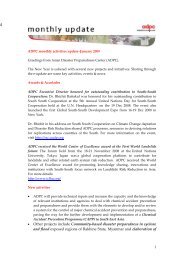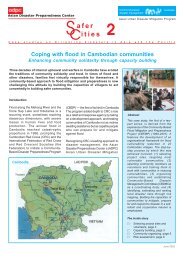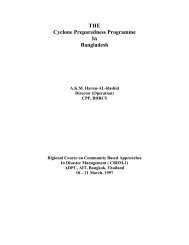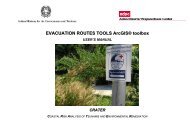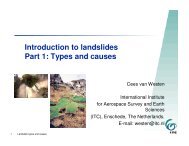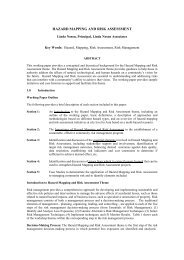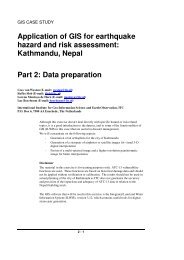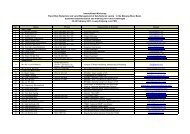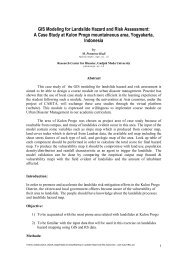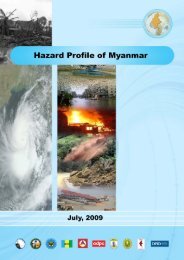community-based disaster risk management and the media media kit
community-based disaster risk management and the media media kit
community-based disaster risk management and the media media kit
You also want an ePaper? Increase the reach of your titles
YUMPU automatically turns print PDFs into web optimized ePapers that Google loves.
chapter 5. country CBDRM case studies<br />
sustenance. NEAR’s over-arching goal thus is to enhance<br />
<strong>community</strong> resilience throughout Indonesia. This is done<br />
by refl ecting on past trends, patterns <strong>and</strong> perceived<br />
vulnerabilities, on-site appraisals to determine validity of<br />
information, cross-sharing of lessons through workshops<br />
<strong>and</strong> abating crisis through implementation of <strong>community</strong><br />
designed small scale resilience activities. These local<br />
<strong>community</strong> initiatives help minimize loss of life when crises<br />
occur, support sustainable recovery <strong>and</strong> resiliency <strong>and</strong><br />
serve as model examples for sharing with o<strong>the</strong>r vulnerable<br />
communities <strong>and</strong> local government offi ces.<br />
Because multiple sectors are often affected by a crisis,<br />
<strong>the</strong> strategy of NEAR is ga<strong>the</strong>ring experts in a variety<br />
of fi elds: education, health, food security, agriculture,<br />
capacity building, <strong>and</strong> economics to share <strong>the</strong>ir knowledge<br />
with participants. It encourages <strong>community</strong> exchange<br />
networks, mapping, mitigation planning, integrated human<br />
development, associations <strong>and</strong> links, concept design <strong>and</strong><br />
proposal development, accountability, awareness raising,<br />
<strong>and</strong> setting up early warning system.<br />
CRS believes that accurate knowledge of <strong>community</strong><br />
needs <strong>and</strong> <strong>the</strong> root causes of crisis will help reduce <strong>the</strong>ir<br />
impact. Building local capacity is one of CRS’s core goals,<br />
<strong>and</strong> NEAR is an important means of achieving this. Local<br />
organizations throughout Indonesia have joined with CRS<br />
to increase <strong>the</strong> collective capacity to respond to crises.<br />
Through workshops <strong>and</strong> o<strong>the</strong>r activities developed by<br />
CRS, <strong>the</strong>se organizations have an opportunity to learn<br />
how to identify <strong>the</strong>ir communities’ unique vulnerabilities<br />
<strong>and</strong> local crises indicators. By analyzing this information,<br />
<strong>the</strong> organizations can develop activities to reduce <strong>the</strong><br />
impact of crises <strong>and</strong> effectively respond to <strong>the</strong>m.<br />
Activities such as awareness campaigns, <strong>community</strong><br />
meetings, <strong>and</strong> <strong>the</strong> distribution of literature on early<br />
warning systems are helping to build individual capacity<br />
141



